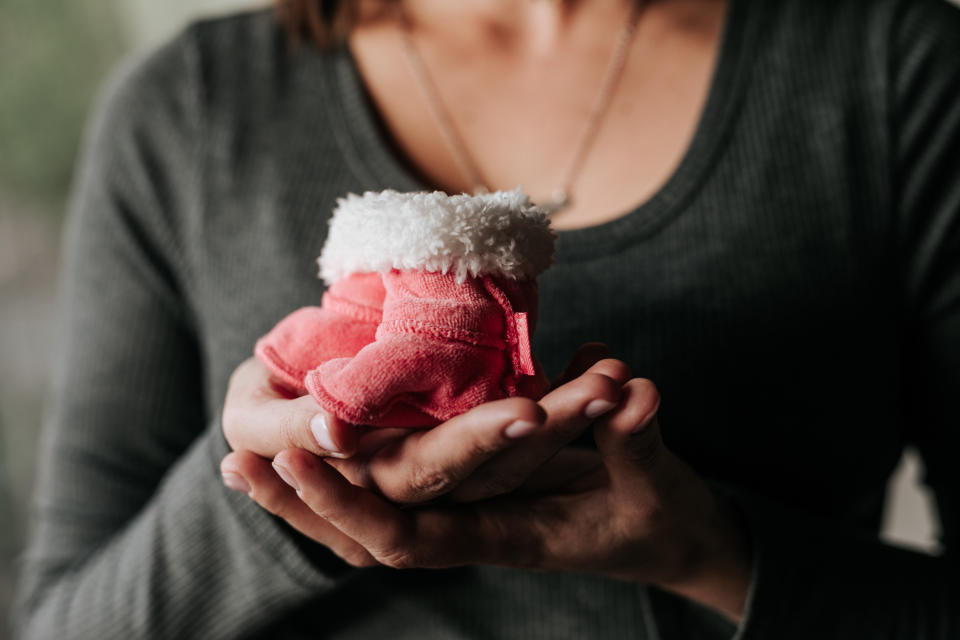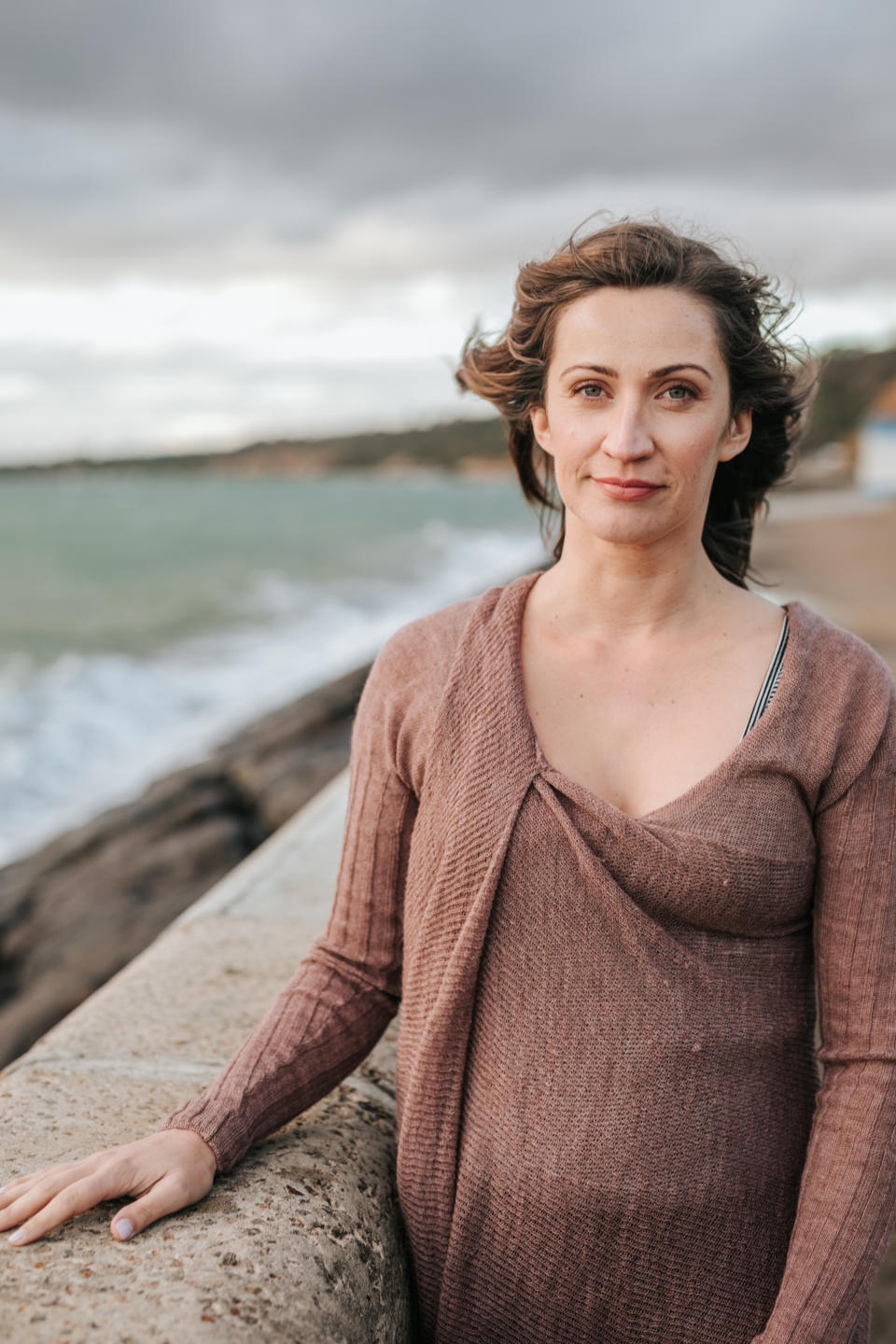'I’m so sorry, but there’s no heartbeat': Mum’s beautiful project after losing her baby
This article discusses stillbirth
After what had been a healthy and uneventful pregnancy, Ami Summers and her husband Dave lost their daughter Arla at 38 weeks, in 2013.
Here, she tells her story, and how through her grief, she wrote Heart Space.
I’d just given birth. A life-changing, beautiful experience: and my body had served us well. It was a short labour, we found moments of exquisiteness within the endurance, and it went as well as it could have.
The room was quiet, and we were empty. The kind of empty that leaves every corner of your body humming, and that stays with you long after. Every ounce of emotional and physical strength had been rung out of our bodies like a wet rag. My thighs were shaking. My body ached – especially my arms.
Now, my husband and I lay exhausted in a small, nested pile, as a family, with our daughter beside us. We lay there and took her beauty in. It was quiet in that room. But still, not as quiet as she was.
Our baby girl Arla, who had died, now lay next to us. Wrapped up perfectly, and lying peacefully – she was so very still. The only thing that was keeping us in that quiet room, was her. The cries of the other babies and happy chatting in the corridors behind our ‘private’ door were bittersweet.

We could hear the screams of the women in the rooms next door to us, the sound of an excited husband outside our door calling his family, and the babies crying in the nursery. I yearned to go home, but that meant leaving Arla forever. So we stayed, for 12 more hours.
48 hours earlier, our lives changed forever when the unthinkable happened. The long pause as the scanner slipped over my suddenly very quiet, bulging belly – searching, like a mirror image for the doctor’s darting gaze over the ultrasound screen.
That pause was a hundred times more excruciating than any other I had experienced up until that moment. And then, those words: “I’m so sorry, but there is no heartbeat.”
The world shattered around us promptly after that sentence was whispered. A moment, that changes the form of what was forever. And as we came to terms with the news that our daughter would never cry, never walk her first steps, never go to school, or hug her mummy or daddy, we also realised in that moment we would still have to give birth to her.
A marathon, the biggest marathon a woman can go through, and no prize at the end. Instead, a collapse, an emptiness, and a sorrow to reconcile forever.
I wanted to be at home, to begin processing what had just happened in our hospital room. The memories, the words that were spoken, the cry that did not come, the silent entry into the world, in that dimmed quiet room. I wanted to sit quietly at home to be with it all. Home meant I could process what had happened in the safety of our cocoon. I was a private person, and I wanted to reconcile in familiarity with my family around.
The paediatrician had been to check on Arla. It was confirmed: she was perfect. The funeral director had been to make arrangements – we would have a small private memorial a week later, no roses. The midwives regularly checked on us: my vitals were great, and they helped us to take photos of her.
12 hours passed, and we were ready to say goodbye. The midwives offered to let us out via the back door, so we wouldn’t have to greet the excited, happy faces in the maternity ward. We left empty armed, down a back flight of stairs, with a bag of pamphlets to send us on our way, and a bag full of baby clothes that weren’t used.

The pamphlets were full of information that were designed to create a sense of support, but I sifted through them and looked for something that wasn’t there. We lay in a pile again, nested at home, with our family gently cupped around us. We just lay there, for a day or so.
Soon, I had days where I was alone. My husband returned to work while I was on maternity leave, and I looked through the pamphlets again. Was there anything in there that I could work through, in my own time, when I couldn’t see the grief counsellor? I was a lead coach, and wanted guidance and tools. I wanted to process through a worksheet, a journal entry, a guided process. Where was it?
Over months, which soon turned into years, I searched for this resource. A gentle accompaniment to counselling, and something I could do in private. I knew exactly what I was searching for. Practical, guided, gentle, as well as deeply useful, and meaningful work. It never appeared. So, after two more losses, and a spontaneous haemorrhage with my son's pregnancy that saw him born swiftly and prematurely, I created it.
The loss of a child or pregnancy remains the loneliest and least understood form of grief. It glitches our whole existence as human beings - we are meant to grow old, and die.
For a mother, the depths of your heart are forever changed as motherhood does to all women. It is a complex experience, and one that we often have to transverse alone at times, as it is so soul-rocking, so foreign, and so sad that to process your memories, thoughts and emotions with someone alongside you is sometimes not possible. Heart Space is for these times.
Sadly, the stories of women who’ve experienced miscarriage, stillbirth, or child loss, aren’t heard enough. In Australia, 2,000 stillborn babies are born every year. Mothers, support people, partners, and family members are all left grief-stricken with few resources for guidance.
In her grief, Ami, a leadership consultant, an author, and mother, looked for guidance. She yearned for practical resources as she and Dave stumbled through — a gentle guide, a beacon in the darkness to help shepherd her. She could not find them. So, when the time was right, she set out to create a resource herself. Drawing on her experience as a mother and as a leadership consultant, and collaborating with a working group of mothers and therapists, Ami wrote Heart Space.
Heart Space, 258-page self-directed, therapeutically reviewed coaching book, was created for those who are sadly experiencing the loss of their child and is designed to help families through all stages of loss. It encourages and guides mindful practices and creativity, and is a safe place for all emotions and thoughts to be voiced, processed, shared and honoured.
Pregnancy and Infant Loss Awareness Day on October 15 is an opportunity to comfort one another, and share our stories.
For support on miscarriage, stillbirth and newborn death you can visit Sands

 Yahoo Lifestyle
Yahoo Lifestyle 

